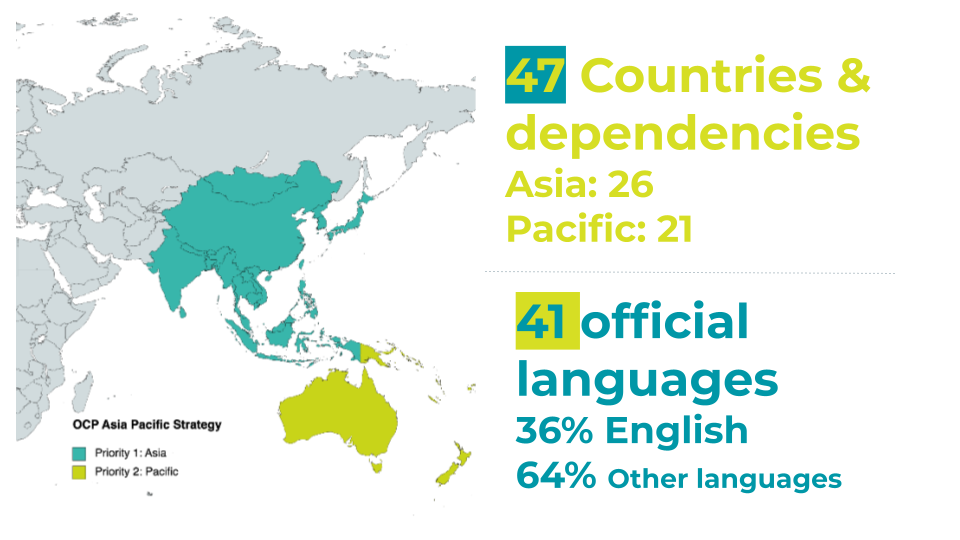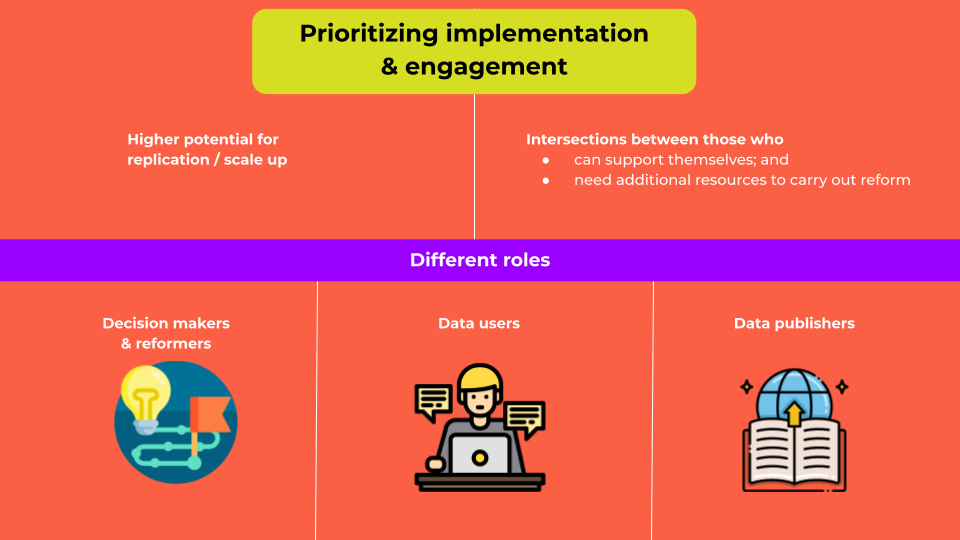The domino effect we need in Asia Pacific: our strategy to create a chain reaction for change

Half of the world’s top 12 spenders on public contracts are in Asia and the Pacific. With 60% of the global population living in the region, public procurement has the potential to change billions of lives for the better. However, this is often easier said than done.
Governments across the region have very different political and economic profiles, from authoritarian regimes to flawed democracies. Access to information and civil liberties are widely restricted – in fact, over 80% of Asia Pacific countries do not have an enabling environment for open government reforms, according to criteria used by the Open Government Partnership.
We have taken all this into consideration in our 2022-2025 Asia Pacific strategy – our first in the region – to drive greater awareness and adoption of open contracting. So in the run-up to 2025, we will focus on:
- Pioneering change and driving reforms
- Amplifying influence with allies and advocates
- Cultivating a community of champions
Let’s take a closer look at how we’re rolling out this plan.

1. Pioneering change and driving reforms
Openness and inclusion in procurement are not yet the norm in the Asia Pacific, so we need to be strategic on where and how we place our bets! We think we can make the biggest difference by starting in places that have good quality and quantity of open data alongside additional enabling factors including freedom of speech, expression, and association. Asia Pacific is vast, so in the immediate term, we will focus on three subregions: East Asia, Southeast Asia, and South Asia.
- Inspiring reforms through demonstration projects
We want fast-start, demonstration projects in the region to inspire reformers to take action. This helps to show what is possible in Asia Pacific compared to other open contracting case studies from far-flung places with different political, economic, and social realities.
To kick things off, we will support pilot projects that demonstrate how to use public procurement data and participatory approaches to fight corruption and improve social or environmental outcomes. This builds directly on the feedback we received from our latest community survey which tells us that anti-corruption and sustainability are top priorities. To achieve scale, we will also prioritize projects that can be replicated across the region.
- Building a data ecosystem to inform action
Data-driven decisions are key to impactful reforms. We recognize that building a data ecosystem that can inform action will take time. It also requires the cooperation of multiple actors. We will engage with:
- Data publishers – to make data readily available for all to use
- Data users – to use and translate available data into actionable insights to aid reforms
- Decision makers and other reformers – to create an enabling environment for systemic change.
Naturally, some of these roles overlap or can even be played by the same actors. However, building these different stakeholder capacities alongside opportunities for meaningful collaboration can deliver significant impacts and lasting reforms, as we are seeing in Indonesia and India.

- Going local
Approximately 63% of government procurement is handled at the subnational level. In Asia Pacific, there are over 300,000 subnational government entities, from densely populated megacities to remote villages. While we recognize the value of working with national governments, this high level of decentralization gives local governments a degree of autonomy and brings our work closer to citizens.
We developed the G20 smart cities open contracting model policy to provide cities with ideas, methodologies, and tools to implement open contracting reforms. We are already working with city governments including Bangkok (Thailand) and Kupang (Indonesia) as well as with state governments like Assam (India).
2. Amplifying influence with allies and advocates
We will build strategic partnerships to leverage influence, expertise, and networks to establish open contracting as a new regional, national, or local norm. Key stakeholders include:
- multilateral and bilateral development agencies such as the Asian Development Bank (ADB) and UK’s Foreign and Commonwealth Development Office (FCDO);
- global or regional networks, initiatives and events, such as the G20, Open Government Partnership, Global Infrastructure Hub, and other issue-focused alliances; and
- influential local partners such as Indonesia Corruption Watch and CivicDataLab who support reforms by helping to identify needs, build capacities and inspire action.
3. Cultivating a community of champions
Open contracting is still a relatively new concept in the region which some reformers may find daunting. We will work to build an active open contracting community in the region and foster a sense of belonging within the broader global movement. We will start by promoting Open Contracting Champions to showcase success and inspire action. A lot of our work will focus on strengthening capacities to advocate for or implement reforms. In time, we hope that our network will evolve into a self-sufficient and thriving community, equipped to drive impact independently.
Let’s go!
Open contracting potential in Asia Pacific is largely untapped and the opportunities are limitless! We are confident that our regional strategy to support partners with co-creating and designing reforms, targeted advocacy, and community building, alongside strategic and technical implementation support will create a domino effect for open contracting implementation in the region.